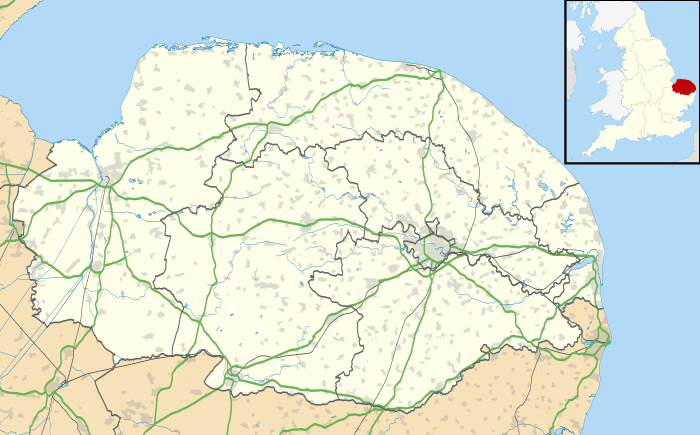Felmingham
| Felmingham | |
 St Andrew's church, Felmingham |
|
 Felmingham |
|
| Area | 7.68 km2 (2.97 sq mi) |
|---|---|
| Population | 561 |
| – density | 73/km2 (190/sq mi) |
| OS grid reference | TG251293 |
| Civil parish | Felmingham |
| District | North Norfolk |
| Shire county | Norfolk |
| Region | East |
| Country | England |
| Sovereign state | United Kingdom |
| Post town | NORTH WALSHAM |
| Postcode district | NR28 |
| Police | Norfolk |
| Fire | Norfolk |
| Ambulance | East of England |
| EU Parliament | East of England |
Coordinates: 52°48′53″N 1°20′24″E / 52.8146°N 1.34°E
Felmingham is a village and civil parish in the English county of Norfolk. It covers an area of 7.68 km2 (2.97 sq mi) and had a population of 564 in 218 households as of the 2001 census,[1] reducing slightly to 561 at the 2011 Census.[2] For the purposes of local government, it falls within the district of North Norfolk.
The village is 2.3 miles (3.7 km) west of North Walsham, 4.3 miles (6.9 km) east of Aylsham and 16.4 miles (26.4 km) north of the city of Norwich. The River Bure passes very close to the eastern side of the village. The Parish of Felmingham and its council is responsible to the council of the District of North Norfolk and that of the County of Norfolk in which it is located.
A Roman temple hoard from Felmingham Hall near the village was acquired by the British Museum in 1925.[3]
Transport links
The village’s closest rail link is at nearby North Walsham Railway station where the Bittern Line from Cromer to Norwich can be accessed and the national rail network beyond. The village is sited along the B1145[4] a route which runs between King's Lynn and Mundesley, and is located between the A149 King’s Lynn to Great Yarmouth road (East of the Village) and the A140 Cromer to Norwich road (To the west). The nearest airport is at Norwich.
The Parish Church
The parish church of Felmingham is dedicated to Saint Andrew. The massive tower dates from the 15th century, whereas the much smaller nave was rebuilt in 1740. There is a peal of nine bells in the belfry. A new hand carved screen was commissioned for the Millennium and contains oak carvings representing scenes from the New Testament, the seasons and farming life[5]
Local Revolutionary
At the time of the Peasants' Revolt of 1381 a resident of Felmingham by the name of Geoffrey Litster, a dyer by occupation, found his livelihood threatened and led a large group of rebels in an attempt to seize Norwich. The Bishop of Norwich and his forces met the rebels on a heath just to the south of North Walsham. The Battle of North Walsham resulted in the defeat and capture of the rebels. Litster as a result of his actions was hanged, drawn and quartered, with quarters being displayed at Norwich, Great Yarmouth, King’s Lynn and at his house at Felmingham, as a deterrent to further rebel uprisings.
Bryant's Heath

A footpath beside the church leads to Bryant’s Heath, a popular local beauty spot and a designated Site of Special Scientific Interest. It is unusual in that it encompasses within a relatively small area a mix of dry heath, wet heath, and fen communities. The different soil types have led to a wide range of plants, including several that are now uncommon in East Anglia. A number of uncommon mosses and lichens have been recorded from the wetter parts of the site.
Notes
- ↑ Census population and household counts for unparished urban areas and all parishes. Office for National Statistics & Norfolk County Council (2001). Retrieved 20 June 2009.
- ↑ "Parish population 2011". Retrieved 4 September 2015.
- ↑ British Museum Collection
- ↑ County A to Z Atlas, Street & Road maps Norfolk, page 230 ISBN 978-1-84348-614-5
- ↑ http://www.geraldadams.co.uk/?p=felmingham.church.screen
External links
![]() Media related to Felmingham at Wikimedia Commons
Media related to Felmingham at Wikimedia Commons